Going to war can be incredibly expensive. As such, the Confederate States of America solicited donations from wealthy citizens. A lot of that gold – “treasure,” as historians and enthusiasts have since called it – remained after the Civil War. What happened to it, however, no one knows, and this has created a mystery that’s spanned over 150 years.
Richmond, Virginia was the Confederate capital
The Confederate States of America were formed prior to Abraham Lincoln taking office in March 1861. These states were opposed to the abolishment of slavery. Vice President Alexander Stephens explained their ideology, saying, “Upon the great truth that the negro is not equal to the White man; that slavery, subordination to the superior race, is his natural and normal condition.”
The Confederacy’s capital city was initially located in Montgomery, Alabama, but soon changed to Richmond, Virginia. Jefferson Davis, a Congressman from Mississippi and former Secretary of War, was named its president.
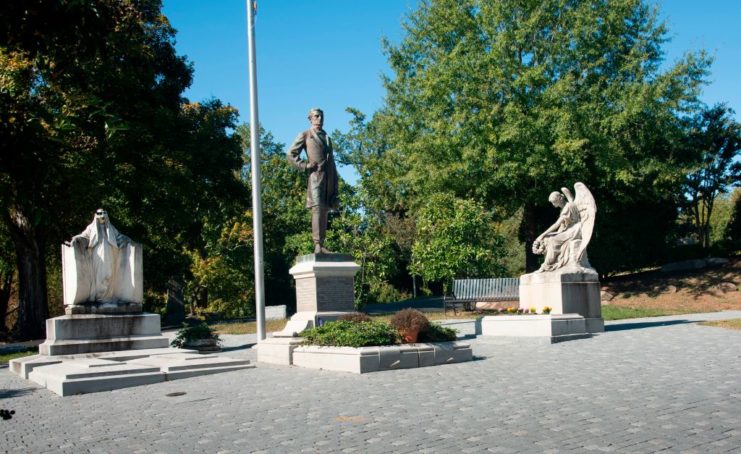
Given how much it cost to go to war, higher-ups in the Confederacy began requesting donations. Women sent jewelry, and there were hundreds of containers filled with gold and silver. Almost half a million dollars in reserve gold was also gathered from a bank in Richmond.
Jefferson Davis leaves Richmond with the gold
On April 2, 1865, an urgent telegram came for Davis from General Robert E. Lee. The Confederate president and other government officials were urged to leave Richmond immediately to avoid being captured by Union troops. Two trains left from the capital that night. On one was Davis, officials and important documents. In the other were cash and gold reserves and jewelry, estimated to be worth around $1 million.
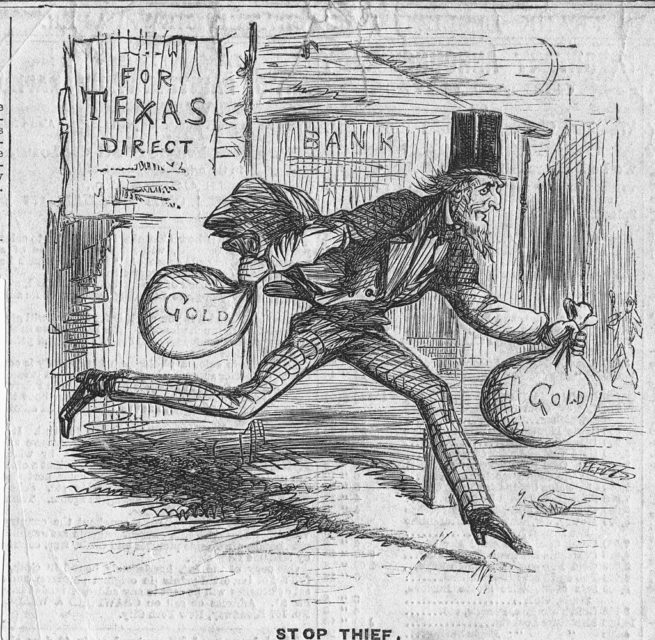
The total amount of money and gold that left Richmond with Davis is unknown. His train, however, encountered some expenses. They had to pay $108,000 to troops who escorted them near the Savannah River, and $40,000 more was spent on supplies in Georgia. As the $450,000 in gold reserves didn’t belong to the Confederacy, it remained untouched.
Jefferson Davis is arrested, but where’s the gold?
Davis was on the run for much of April 1865. Abraham Lincoln was shot and killed on April 14, a loss which the Confederate president lamented, as he’d felt Lincoln would have been easier on the South than Andrew Johnson.
After the decision was made to disband the Confederate government on May 4, 1865, Davis entrusted $86,000 to two Confederate navy officials, whom he tasked with smuggling the money to England. That didn’t happen, however, and it is believed to have been stolen. Davis then deposited the reserve gold in a vault in Washington, Georgia, before continuing on.
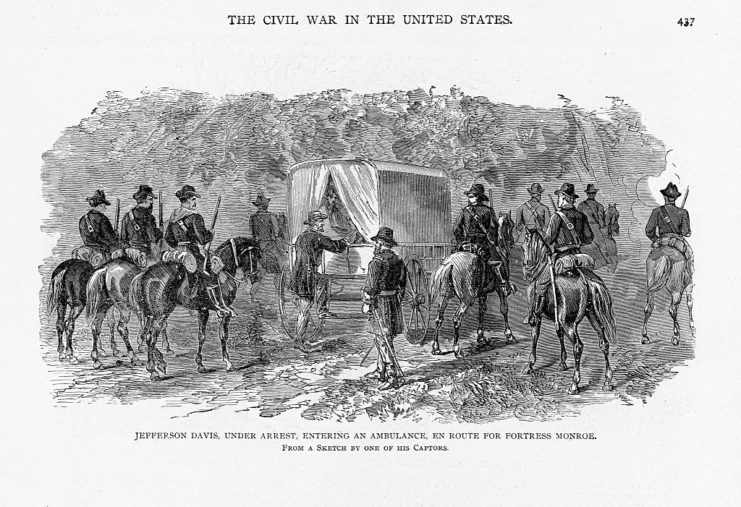
Davis was arrested on May 10 by members of the 4th Michigan Cavalry. When he was captured, he had his wife’s shawl over his shoulders. At the time, it was reported he’d dressed as a woman to avoid capture, but was later said to have been wearing it due to his severe sensitivity to cold weather.
Most importantly, Davis only has a few dollars on him when he was captured, which led to a long-running question: where did all the money and gold go?
Theories abound over what happened to the money
What happened to the Confederate money? Some believe it was stolen by the Union soldiers who arrested Davis, while others speculate it was hidden long before his arrest, with the aim of keeping it out of the North’s hands. The gold from the Richmond bank was accounted for, but was later stolen by around 20 armed men in Danburg, Georgia.
Of what was taken, only $140,000 was recovered.
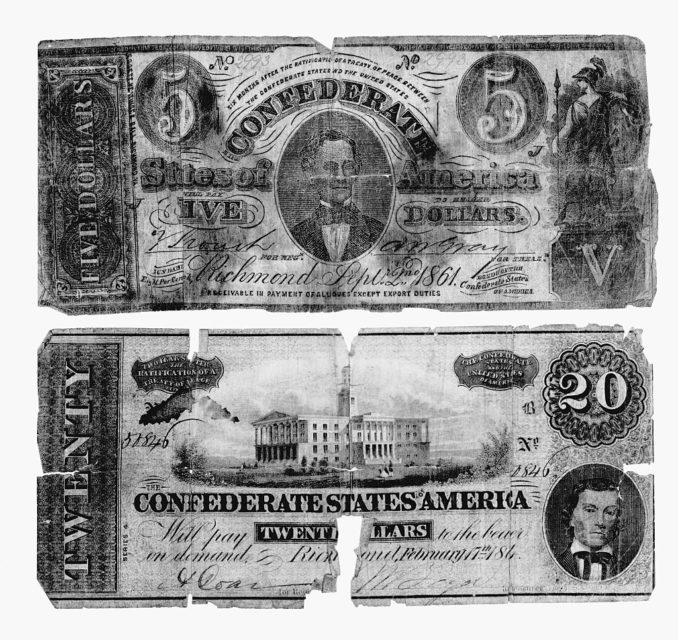
As for the rest of the money, little is known, and tales of money found in areas connected to the American Civil War have been told for more than 150 years.
Civil War historian William Rawlings explained, “People like to believe there’s something out there. They left Richmond with a bunch of money, and when [Davis’ group] was captured six weeks later, they didn’t have it. The question is, what happened? And people’s imaginations take over from there.”
Confederate gold is referenced in a number of books and movies
The legend of the Confederate gold is referenced in many films. In the Civil War-era movie, Gone With the Wind (1939), Rhett Butler, played by Clark Gable, is rumored to have stolen the treasure. The lost gold also played a key role in the legendary 1966 Western film, The Good, the Bad and the Ugly. In the movie, the characters are hunting for $200,000 worth of gold that is rumored to be hidden in a cemetery.
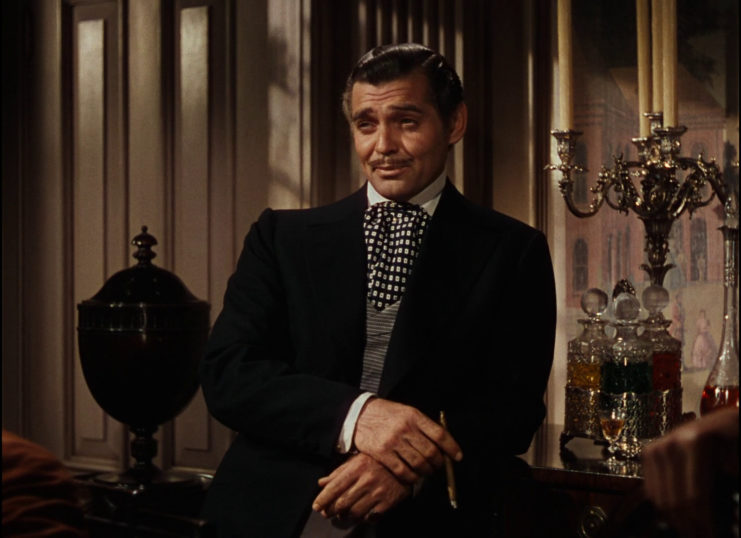
More from us: The Success of George H. Thomas’ Union Soldiers During the American Civil War
The Confederate gold, again, showed up in the 1994 sci-fi movie, Timecop. In the film, a thief goes back in time to hijack the money using advanced technology. Another sci-fi production, 2012’s Alcatraz television show, also featured the gold, with its characters realizing the treasure was buried beneath the prison back in 1960.
